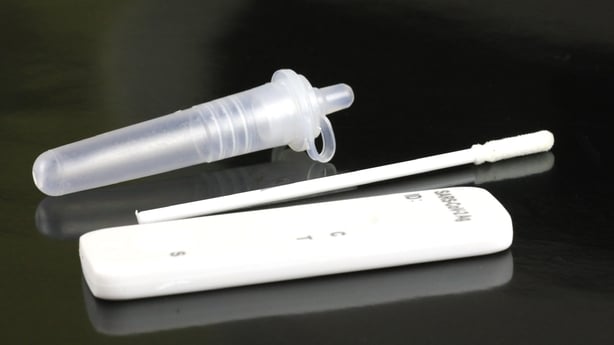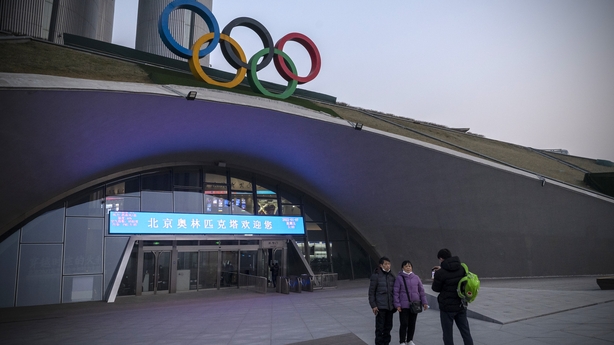China has reported more cases of the highly transmissible Omicron coronavirus variant today, with authorities on high alert over flare-ups in major cities just weeks ahead of the Beijing Winter Olympics.
The emergence of the fast-spreading variant is yet another test of China's zero Covid strategy, with authorities already battling several outbreaks - including in Xi'an where 13 million city residents were in their third week of lockdown.
Fears are growing about a cluster of infections in the northern city of Tianjin, which was linked to two Omicron cases reported today in the city of Anyang around 400 kilometres away.
"The general public should not leave Tianjin unless essential to do so," city officials said in a statement Sunday.
Those who need to leave must obtain official permission and test negative for the virus within 48 hours of their departure, it added.
Schools and university campuses have been closed, and trains into Beijing from Tianjin have been cancelled.
Road checkpoints have been set up for vehicles entering the capital.
Tianjin - just 150 kilometres from Beijing - has already ordered the testing of all 14 million residents.
Another 21 cases were reported in the city this morning, although the strain of virus wasn't confirmed.
Footage from state broadcaster CCTV showed masked people in Tianjin's Nankai district queueing for virus tests on Sunday from medical workers in white hazmat suits.
Gu Qing, director of the Tianjin Municipal Health Commission, told reporters at the weekend that the new cases are "mainly students and their parents who go to the same nursery and school."
Swab throat too when using rapid antigen test, Israeli health official says
People self-testing for Covid-19 should swab their throat as well as their nose when using rapid antigen kits to increase the chances of detecting the Omicron variant, a top Israeli health official said.
The recommendation goes against the advice of the US Food and Drug Administration, which has said manufacturers' instructions should still be followed and that any incorrect use of throat swabs could pose a safety risk.
On Israeli Army Radio, Sharon Alroy-Preis, Israel's public health chief, said antigen tests, used widely in the country, are less sensitive than PCR tests in detecting illness.

"In order to increase their sensitivity we will from now on recommend swabbing the throat and the nose. It's not what the manufacturer instructs but we are instructing this," she said.
With Omicron pushing daily infection cases to record highs, Israel's testing centres have been struggling, prompting health officials to prioritise risk groups for PCR testing and trust younger, vaccinated people to test at home if exposed to a carrier.
Some infectious disease experts have advocated throat swabbing with antigen tests because people can already transmit Omicron to others when it has infected their throat and saliva but before the virus reaches their nose.
Israel has confirmed around 1.5 million infections since the pandemic began and more than 8,000 deaths. Around 60% of its 9.4million population is fully vaccinated, Health Ministry data shows.
Do not help crashed Olympics vehicles, Beijing police warn

Also in China, police in Beijing have warned residents not to help any Winter Olympics vehicle if it is involved in a crash -- to avoid breaching the Games' strict bubble against the coronavirus.
China's capital will host next month's Olympics in a "closed loop" ensuring no athletes or other participants come into contact with the public.
Authorities closed up the bubble last week meaning thousands of staff, volunteers, cleaners, cooks and coach drivers will be cocooned for weeks with no access to the outside world.
The measures - part of China's bid to maintain its zero-Covid strategy - are so strict that Beijing police issued a statement saying locals should not even rush to help an Olympics vehicle should it crash.
"In case of traffic accidents with special vehicles for the Winter Olympics, please pay attention to maintaining a safe distance," Beijing's Traffic Management Bureau said in a post on the Twitter-like Weibo.
"Do not make contact with vehicles or personnel in them and wait for professionals to arrive at the scene."
That contrasts with the Covid-delayed Tokyo Summer Olympics, which allowed some movement in and out for volunteers and other personnel.
Mr Claireaux is member of Parliament for the constituency of Saint-Pierre and Miquelon, a French overseas territory in the north-western Atlantic Ocean, near the Canadian province of Newfoundland and Labrador.
"I am obviously going to launch a legal complaint. Some people think the right decisions are not being made. We are al lreceiving death threats by mail, at some moment this has to stop," Mr Claireaux told France Info.
Ugandan children back to school after nearly 2-year Covid closure
Uganda ended the world's longest school closure today, ordering millions of students back to the classroom nearly two years after learning was suspended because of the coronavirus pandemic.
Some 15 million pupils have not attended school in Uganda since March 2020 when classrooms were shuttered as Covid-19 swept the world.
Education Minister John Muyingo said all students would automatically resume classes a year above where they left off.
"All schools have implemented guidelines and standard operating procedures to ensure the safe return of children to schools, and measures have been put in place to ensure those who don't comply do so," he said.
Mr Muyingo said any private schools demanding fees above pre-pandemic rates would be sanctioned.
Child rights groups had criticised Uganda's decision to keep schools fully or partially shuttered for 83 weeks, longer than anywhere else in the world.
"We can't let this happen again. We must keep schools open for every child, everywhere," the UN child rights group UNICEF said on Twitter.
The charity Save the Children said students would struggle to adapt after falling so far behind, and warned there could be high dropout rates in coming weeks without urgent intervention to support learners.
Uganda has recorded 153,762 cases of Covid-19 and 3,339 deaths, according to the latest government figures issued on 7 January.
Philippines businesses take hit amid record run of Covid-19 cases
A Covid-19 spike has disrupted businesses in the Philippines, with banks, malls and airlines reducing operations and some schools suspending online classes due to staff sickness, as authorities announced a third day of record new cases today.
The Philippines reported 33,169 new coronavirus infections today, bringing its overall tally close to three million as the Omicron variant takes its toll, with the overpopulated capital Manila and surrounding provinces worst hit.
Commercial airlines have cancelled more than a hundred domestic and international flights as cases surge, with airlines reporting infections among staff and lower demand due to uncertainty among travellers.
The healthcare system is at risk of being overwhelmed, Health Undersecretary Maria Rosario Vergeire told ANC news channel, calling on symptomatic people to immediately isolate and get tested.
The Southeast Asian nation was gradually easing restrictions late last year as vaccination rates rose and infection rates fell, but authorities were last week forced to tighten mobility curbs to contain a rapid spread.
Mayors in the capital region see no need to further restrict movement for now, however, because people were self regulating, said Benjamin Abalos, chairman of the capital's council of mayors.

